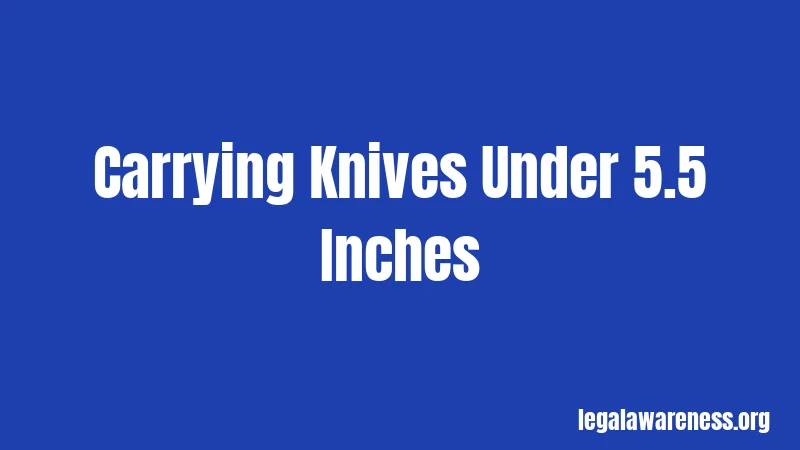Texas Knife Laws in 2026: What You Actually Need to Know
Most people have no idea how knife-friendly Texas really is. Seriously. If you’re thinking about carrying a knife, hunting with one, or just keeping one at home, Texas has some of the most permissive laws in the entire country. The good news? The rules are actually pretty simple.
Here’s what makes Texas different. Most states get tangled up in knife categories. Is it a switchblade? A butterfly knife? A Bowie knife? Texas doesn’t care about those things. Not anymore. Back in 2017, lawmakers decided to simplify everything. Now the only thing that matters is how long your blade is.
What Is a Knife Under Texas Law?

Texas Penal Code Section 46.01 defines a knife in a straightforward way. It’s any bladed handheld tool that can seriously hurt or kill by cutting or stabbing. That covers pocket knives, hunting knives, kitchen knives, switchblades, butterfly knives, and basically anything with a sharp edge.
The law doesn’t care about how you open it. It doesn’t care about the blade shape. It doesn’t care about the handle design. All that matters is blade length. Pretty straightforward, right?
There are only two categories you need to know about. And honestly, this is the part most people get wrong.
The Two Types of Texas Knives
Regular Knives are anything with a blade 5.5 inches or shorter. These are the knives you can carry almost anywhere in Texas. No questions asked. No permit required.
Location-Restricted Knives are knives with blades longer than 5.5 inches. Adults can own and carry these almost anywhere, but there are specific places where they’re prohibited. That’s where things get interesting.
Stay with me here. Understanding the difference between these two categories will keep you legal.
How Texas Measures Blade Length

This matters more than you think. Here’s where a 1999 court case called McMurrough v. State of Texas comes in. The court ruled that blade length includes the flat-edged part of the knife. This means both the sharpened portion and any remaining flat edge up to the handle.
Confused about the difference? Let me break it down. Imagine a knife that measures six inches total from tip to handle. But only 5.4 inches of that is actually sharpened. Texas still counts the whole flat-edged part. It’s illegal because it hits the 5.5-inch threshold.
What does this mean for you? When you’re shopping for a knife, measure carefully. Don’t assume. If there’s any doubt, round down. Honestly, this is the part most people miss, and it could get you in trouble.
What Knives Are Completely Legal in Texas
You can legally own any type of knife in Texas without restrictions. This includes switchblades (legal since 2013), butterfly knives, gravity knives, daggers, swords, machetes, and Bowie knives. Own as many as you want. Store them at home. Keep them in your collection. The state doesn’t limit knife ownership.
There’s only one exception. Knuckle knives—knives with brass knuckles built into the handle—are still illegal to possess. That’s it. Everything else is fair game.
Carrying Knives Under 5.5 Inches

Here’s the simple rule. Adults and teenagers can carry knives with blades 5.5 inches or shorter anywhere in Texas. Anywhere. This applies to both open carry and concealed carry.
You can take these smaller knives to work. You can carry one in school (with your school’s permission). You can bring one to a restaurant, a bar, a courthouse, or pretty much any location. The law doesn’t restrict you.
Examples of knives you can carry anywhere include most pocket knives, utility knives, small fixed-blade knives, and hunting knives under 5.5 inches. If your blade is 5.5 inches exactly or shorter, you’re in the clear.
Okay, pause. Read this carefully. People under 18 have different rules, and this is important.
Rules for Teenagers (Under 18)
Anyone under 18 can carry knives with blades under 5.5 inches anywhere in Texas. No restrictions. That part is easy.
But here’s where the law changes. Teenagers cannot carry location-restricted knives (over 5.5 inches) unless they meet specific conditions. Those conditions are: they’re at home, in their own vehicle, or under direct adult supervision.
This means your 16-year-old can’t bring a large hunting knife to school without permission. They can’t carry a machete to their job. They need to be supervised by a parent or guardian.
One important thing to know. You’re not alone if this confuses you. Most parents don’t realize how strict these rules are. It’s actually the law that makes sense for safety reasons.
Where You Can’t Carry Long Blades
Now, here’s where it gets serious. If your knife has a blade over 5.5 inches, certain locations are completely off-limits. This is from Texas Penal Code Section 46.03.
Schools and Universities top the list. You cannot bring a location-restricted knife to any school or educational institution. This includes high schools, colleges, and universities. This rule applies to all grounds, buildings, and school vehicles.
Sports Events are also prohibited. High school games, college sporting events, and professional games don’t allow location-restricted knives. Same rule for other sports and interscholastic events.
Healthcare Facilities require written permission. You can’t bring a location-restricted knife to a hospital or nursing home without asking first. Same with mental health facilities.
Bars and Restaurants that get most of their money from alcohol sales don’t allow these knives. If 51% or more of their revenue comes from serving alcohol, location-restricted knives are prohibited.
Amusement Parks also ban location-restricted knives. So does any facility that’s defined as an amusement park under Texas law.
Correctional Facilities completely prohibit location-restricted knives. Prisons, jails, and detention centers don’t allow them.
Other restricted places include courthouses, government buildings, and secure areas of airports.
Not sure what counts as a violation? It’s actually not that complicated. If you’re in a building or location and you think your knife might not be allowed, ask first. Don’t risk it.
Recent Changes and Bills Coming for 2025
Wait, it gets better. Hold on, because this part is important.
House Bill 2239 passed the Texas House with full support in 2025. It’s currently in the Senate Criminal Justice Committee. This bill would make exceptions to the bar and alcohol restriction. It would allow location-restricted knives in bars and restaurants that get most of their money from alcohol sales.
The bill would also make an exception for amusement parks.
This is significant. Similar bills have gained strong support before. The Senate passed comparable legislation by overwhelming margins in 2019. The House approved similar measures in 2021 and 2023. None became law until now. The consistent support suggests Texas might soon expand where you can legally carry longer knives.
But here’s what matters today. House Bill 2239 hasn’t become law yet. For now, the restrictions still apply. Don’t assume they’ve changed unless the law is signed.
Penalties and Legal Consequences
Let me explain what happens if you break these laws. The penalties vary based on where you carried the knife and what type it was.
Most location violations are Class C misdemeanors. You face fines up to $500 but no jail time. This applies to carrying a location-restricted knife in most prohibited places. It’s less severe than a felony, but still no joke.
School violations are the exception, and they’re harsh. Carrying any location-restricted knife on school premises is a third-degree felony. You could face 2 to 10 years in prison and fines up to $10,000. This stark difference shows how serious Texas takes school safety.
If you’re under 18 and illegally carry a location-restricted knife, it’s a Class C misdemeanor. You face fines up to $500. But giving a location-restricted knife to someone under 18 without parental permission is a Class A misdemeanor. That’s up to one year in jail and fines up to $4,000.
Honestly, this is the part most people miss. Even accidental violations can result in criminal charges. Courts don’t usually require intent for weapons violations. Always check your pockets and bags before entering restricted areas.
Self-Defense with a Knife in Texas
Texas recognizes your right to self-defense. You can use a knife to protect yourself if you reasonably believe deadly force is necessary. But here’s the catch. Three things have to be true.
First, the knife must be legally carried in that location. You can’t claim self-defense with an illegally carried knife. Second, you must reasonably believe deadly force is necessary to protect yourself, your property, or someone else. Third, you must not be engaged in criminal activity.
Think of it like a traffic ticket, but with more serious consequences. The law doesn’t protect illegal carry.
Special Situations and Exemptions
Military members and peace officers have exemptions from most knife restrictions. They can carry location-restricted knives while performing official duties or traveling to and from work.
Security officers with proper licensing also have exemptions. Same applies to animal control officers and certain government employees.
Historical demonstrations and ceremonies have an exception too. If you’re carrying a knife for a historical reenactment or ceremony where the knife is significant, you might have legal protection.
Your Vehicle Is Your “Safe Harbor”
Here’s something helpful. Your vehicle is considered a safe place for any knife size. You can transport long knives in your vehicle while driving on public roads. This covers travel to hunting spots, knife shows, or any other destination.
But don’t leave your knife sitting on the passenger seat. Keep it secure. And don’t carry it into a restricted building.
State Preemption Protects Your Rights
Texas Local Government Code Section 229.001 stops cities and towns from making knife laws stricter than state law. This means a city can’t ban knives that state law allows.
This is huge. You can travel throughout Texas knowing your rights don’t change at city limits. There’s one statewide standard.
Now, here’s where enforcement can get weird. Business policies and private property rules still apply. A restaurant can ban knives even if state law allows them. But at least the law is uniform. That’s more than many states offer.
Frequently Asked Questions
Are switchblades legal in Texas?
Yes. Switchblades have been legal since 2013. They follow the same blade-length rules as any other knife.
Can I carry a butterfly knife (balisong)?
Yes. Butterfly knives became legal in 2017. They’re treated like any other knife based on blade length.
What about machetes?
You can legally own a machete. Most machetes have blades over 5.5 inches, making them location-restricted. You can carry them in most places but not in the restricted locations listed above.
Can I carry a knife to work?
Yes, if your workplace allows it. Bring knives under 5.5 inches anywhere. Longer knives depend on your workplace location and policies.
What if I forgot my knife in my bag when entering a restricted area?
Even accidental violations can result in charges. This is why checking your bags matters. The law doesn’t require intent. Be vigilant.
Final Thoughts
Texas has given you something special. One statewide law. Simple rules based on one measurement. No confusing categories. No complex rules that change city to city.
You can carry almost any knife almost anywhere, as long as you know the basics. Keep blades under 5.5 inches and you’re mostly protected. Go longer and know the restricted locations.
Now you know the basics. Stay informed, stay safe, and when in doubt, check the location or ask a lawyer. You’ve got this.
References
- Texas Penal Code Chapter 46 – Official state statute on weapons and knife regulations
- Texas Knife Law Overview – American Knife and Tool Institute detailed breakdown
- Texas Local Government Code Section 229.001 – State preemption law preventing local restrictions stricter than state law
- Texas School Safety Center – Knife Law Updates – School-specific knife law guidelines and enforcement
- Urban EDC: Texas Knife Laws 2025 – Current enforcement practices and legal updates
